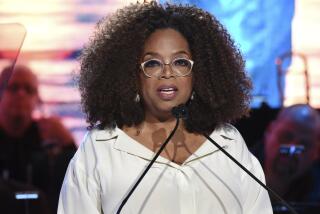Oprah’s Big Day at a Baltimore School
Oprah had come to town and that meant trouble. Because why else would she come to town?
Oprah Winfrey wanted to feature “violence in the public schools” on her show, the most popular syndicated talk show on television.
But she didn’t want to bring people into her Chicago studio to talk about it. She wanted to go to the scene--the scene of actual violence--a city filled with fear and tension, which meant she had virtually the whole country to choose from.
But city after city turned Oprah down. I was told that Chicago said no and Los Angeles said no and Detroit said no.
I can’t imagine why. If your city was undergoing shooting, stabbings and random violence in the schools, wouldn’t you want Oprah to come to your town and put it on TV in living color?
Baltimore went for it. Baltimore is where Oprah got her first big start on TV and to many Baltimoreans she ranks right up there with H. L. Mencken in terms of local cultural heroes.
So how could they say no?
School violence is a hot topic in Baltimore. A number of kids have been shot inside the schools. Others have been raped, savagely attacked, etc.
The average citizen no longer expects a lot from his public schools. We used to expect that our kids would get smarter, learn social values, develop physically as well as mentally, and be introduced to the fine arts.
We no longer expect that. We would be delighted if that happened, but these days we would be happy (actually, we would fall over in a dead faint) if the schools could merely guarantee that every high school graduate could read, write and handle basic math.
In other words, we have scaled down our expectations. But we have not scaled them down so far that we don’t expect our kids to come home alive.
Parents used to see school as a sanctuary where their kids would be safe from the violence of the streets. Today, the violence has entered the schools, and there is no sanctuary.
Educators are dismayed. Parents are alarmed. Kids are scared to death. In others words, great TV.
So, Oprah set up her show in Southwestern High School in Baltimore, where a student had been shot in the hallways a month before.
“Kids are coming to school armed with Uzis!” Oprah began her show. “Kids are hiding guns in their underwear! Knives in their socks!”
All around her in the school gym were hundreds of students, teachers, parents, officials, concerned citizens and security guards.
Security was very, very tight. There were uniformed police and security guards in military dress. And everybody had to walk through a metal detector. Oprah may have come to report on school violence, but she did not want to be a victim of school violence.
“I brought my own security,” she joked on TV.
The irony is that the mayor of Baltimore, Kurt Schmoke, who became nationally famous for endorsing the decriminalization of drugs, does not want metal detectors in the schools. Oprah had to arrange for her own.
Schmoke does not want metal detectors, he says, because they would make the schools “an armed camp.”
Funny, most people thought the schools were already an armed camp, and metal detectors might disarm them. But the mayor is worried about the city’s image. Metal detectors look bad.
And even though metal detectors protect him at city hall, and metal detectors protect his city council, and a metal detector was brought in to protect Oprah, no metal detectors protect the children of Baltimore.
Because it might make the city look bad. But what did they think the “Oprah” show was going to do? Make the city look good?
The show was what you would expect. Kids standing up and telling horror stories. Parents standing up and expressing outrage. Concerned citizens standing up and expressing concern.
At the very end of the show, Oprah called for solutions. Which is the difference between concerned TV and exploitative TV.
Exploitative TV goes into tense situations just because the situations are tense and this makes a good show.
But concerned TV goes into tense situations to solve problems.
So Oprah moved her microphone over to a woman who said the way to end violence in the schools was to bring back prayer.
Then a kid got up and urged everybody “to look at the whole picture.”
A woman got up and urged parents to go to PTA meetings.
Another kid got up and called for a dress code.
Personal development, another said.
Parental involvement, one more said.
Career guidance, the last one said.
And the show was over.
“Thank you, Baltimore!” Oprah said.
Well, that’s one problem solved. I can hardly wait until next week.
More to Read
Sign up for Essential California
The most important California stories and recommendations in your inbox every morning.
You may occasionally receive promotional content from the Los Angeles Times.










